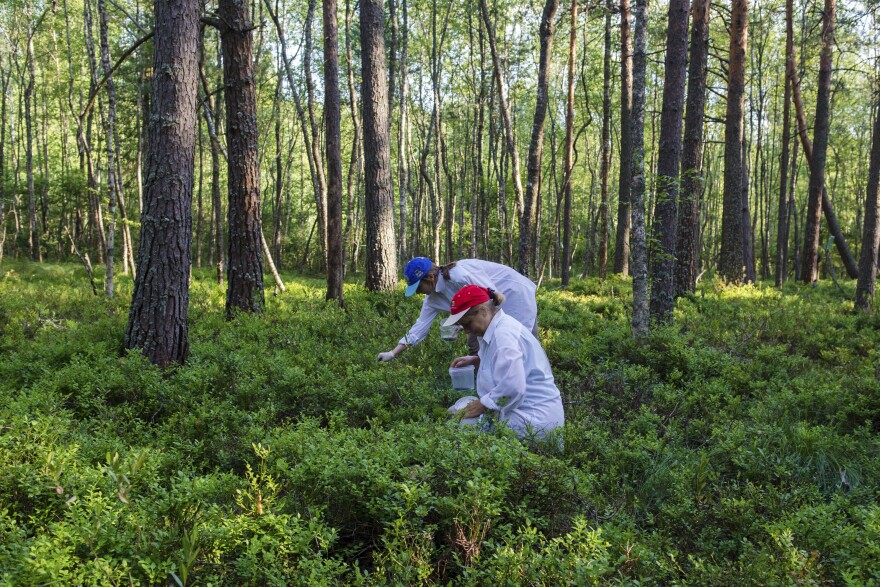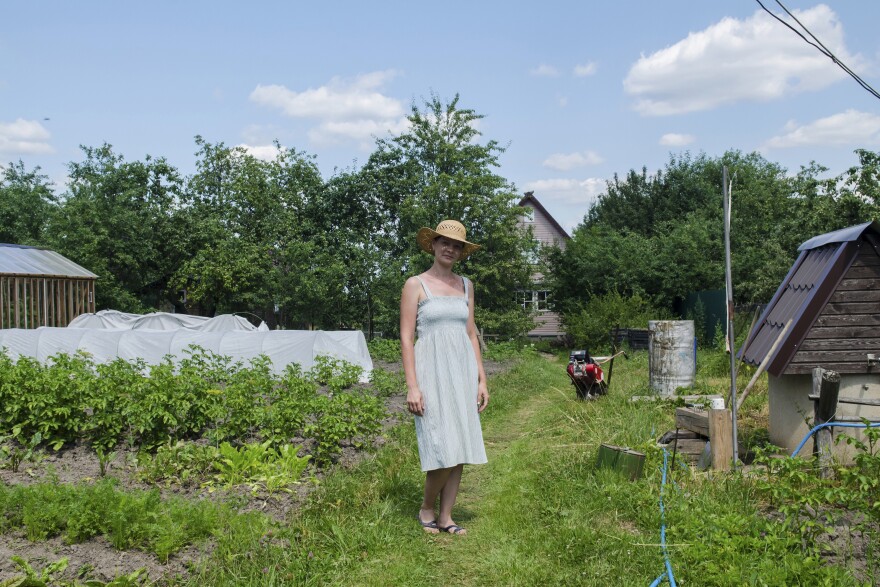YAROSLAVL REGION, Russia — My mother-in-law, Tatyana, surveys her half acre of paradise. It's located at the end of an overgrown path, a few miles down a dirt road off the main highway to Moscow. The property consists of a three-room cottage with no running water, a vegetable garden and a trim lawn bordered by lilacs, firs and pines.
Tatyana and her late husband built the dacha, or summer house, in 1992, the year after the Soviet Union collapsed. She remembers arriving in a truck that dropped off their furniture in front of the little two-story house surrounded by wheat and oat fields. In the beginning, the dacha didn't even have power.
"We lived very well without electricity," Tatyana says. "All day we were busy, walking in the woods exploring. And in the evenings, we would sit around a kerosene lamp and play Monopoly."
In the Russian imagination, the dacha occupies a near mythical place. Once the reserve of the landed nobility, the summer house gained popularity with urban professionals in the late 19th century; in the Soviet era the dacha became available to everyone, from writers to factory workers.
Nowadays, a dacha can be anything from a two-room shack to an oligarch's imitation French chateau. Every summer, Russian cities empty out as millions of people escape stuffy, cramped apartments to reconnect with their roots in the countryside.
Tatyana, a Muscovite, was initially drawn to the dacha because of the nearby forests with their bounties of berries and mushrooms. Only later did she take up gardening. Now, Tatyana and her husband Alexander spend their summer weekends on the property, even though the 80-mile drive can take up to four hours with dacha traffic. She has often thought of selling the place.
"But I just can't, because I always come back in the spring and want to do so much here and go into the woods," Tatyana says. "For some reason I can't sell it, even though it takes so much out of you physically."

The inconveniences of dacha life — the outhouse, the spotty cellphone coverage and the trips to the well — are far outweighed by its therapeutic effects.
"Here those city problems just disappear," says Tatyana. "The wildness clears your mind of everything that's unnecessary."
There's always something to do at the dacha, and it's that existential, physical activity that stressed-out city dwellers crave.
In the nearby village, Andrei Kuznetsov is sweating in the midday sun as he piles up firewood outside his parents' quaint house, which has intricate woodwork around the windows. During the pandemic, Andrei lost his job as a manager in Moscow and now has the time to fix up the house that his great-grandfather built a century ago. The family homestead boasts a vegetable garden, chickens and five goats.
"Country living is romantic when you get used to it," Andrei says. "That means 80% work and 20% romantic life. No work, no play."

His partner, Natalya, a Moscow schoolteacher, agrees.
"This is a real vacation from the city, the noise, the people and the commotion. When you work in the garden or with the animals, you rest," she says. "I can't imagine my life without this place."

One of my mother-in-law's neighbors, Vladimir Berestnev, loves his dacha so much that he installed plumbing and central heating to make it comfortable in the winter as well. But the retired accordion player says his two sons rarely visit.
"My younger one said: 'I haven't been back for five years and won't be for another five,'" says Vladimir. "The dacha isn't for everyone."
In 1986, Vladimir became the first Muscovite to buy a plot from the state-run farm that once owned the land here. Gradually cottages sprang up, the farmland was privatized and dacha owners started replacing the inhabitants of the hamlet. Now there is only one villager left, Vladimir says, and he spends most of his time in Moscow.

Galina Boyarinova, who owns the adjoining property to Tatyana's, works during the week as an accountant in Moscow.
She recalls her early years of dacha life with nostalgia and a laugh.
As a young mother, she says, she slept with an ax next to her bed, even though the only dangers she ended up facing were an angry billy goat and some drunken shepherds looking for moonshine.
Her daughter married a local man, and they held their wedding on the village's annual summer holiday, with Vladimir playing his accordion.

"We used to set up tables for the holiday right here under the trees," says Galina, standing at the gate to her dacha. But now there is nobody left to celebrate the holiday.
Also gone is the country store in a log cabin a few miles down the road. Twice a week, the avtolavka — a shop on wheels — came trundling by. Galina remembers how the village babushkas put on silk dresses for the occasion and waited for the food truck on a big log. They memorized foreign words like "Hubba Bubba" and "Snickers" to buy treats for their grandchildren.
The dacha children spent the long summer days roaming the gardens and forests.

"Our kids put on shows," Galina says. "They would hang up curtains on the swings, and the stage was right here. They made their own costumes and handed out tickets to all the babushkas in the village."
The old folks have since passed away, and the children have grown up.
But now a new generation is returning to the creaky swing set at Galina's front gate. My wife Svetlana sits with our 15-month-old boy, Leo, on the same swings where she played as a girl.
Galina and her husband want to retire here. Maybe one day she will tell Leo about his first visit to the family dacha when he comes with his own child.
Copyright 2023 NPR. To see more, visit https://www.npr.org.



